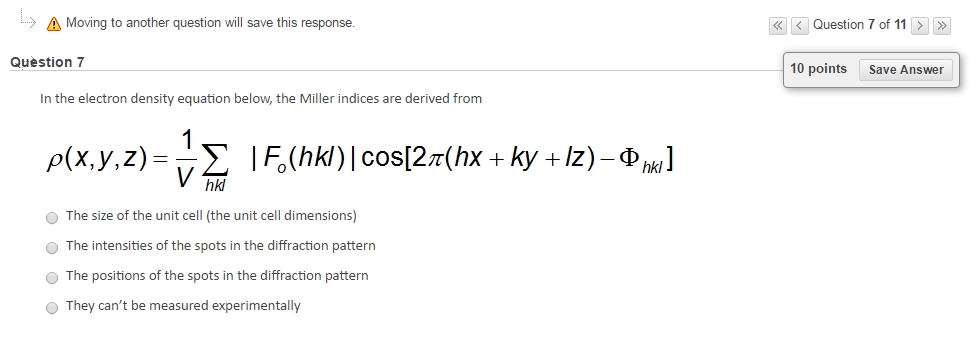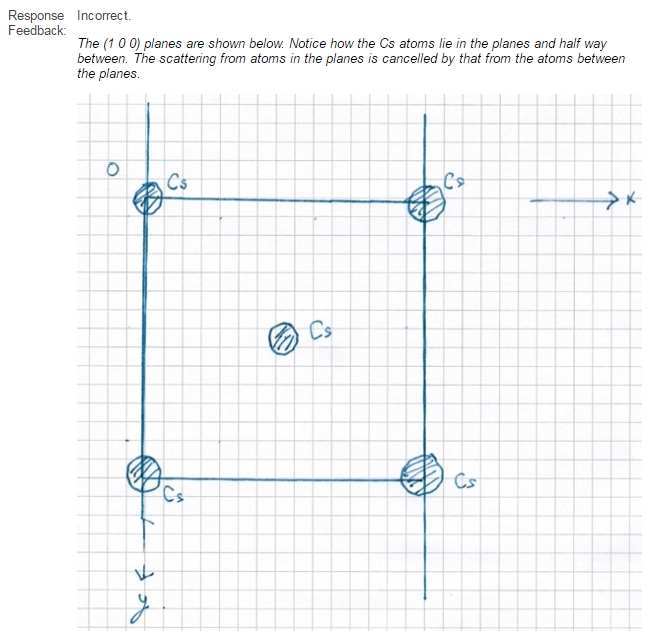
Formative online quizzes have been shown to be useful in helping students engage with course material and provide feedback on their understanding of a topic. They can help students structure their study time by providing prompts on areas of difficulty. I decided to incorporate formative feedback through quizzes in my own teaching. A number of questions with detailed feedback were written to accompany a second year course in crystallography – the following summarises the intentions and outcomes of this initiative.
Aims of quizzes
The idea for doing this actually came from a horticulture course I did last year at the Royal Botanic Gardens! In that course the MCQs each evening were assessed, but you could do as many practice quizzes as you liked prior to the one that was actually assessed.
My aim in setting the questions was not to make them too obvious, trying to stretch the students a bit. There was a mixture of conceptual questions, often based on graphics or diagrams, but there was some manipulation of equations as well, and some questions where students were asked to identify the role of different terms in a centrally important, but quite complex, equation.
The material was based on what was covered in each of the three lectures, and my intention was that the students would do the MCQs after each lecture. In practice I think they were used more for revision.

Designing feedback
The aim in giving the feedback was that it should be extensive enough that students would be able to get all they needed to know straight away without having to come and find me or wait until the tutorial. So I avoided giving hints, though that might be an idea for development – e.g. does the student want a hint or the full answer? I think the approach worked as I didn’t get many questions based on the MCQs.
Analysis of questions and performance
34 questions were set in Learn. It is possible to run an analysis of all the answers to determine question difficulty and discrimination. 33 of these were rated ‘good’ (discrimination > 0.3). That’s very useful to know! The students found the questions mostly medium-hard; there was 1 easy question (score > 8/10), 28 medium questions, and 5 hard questions ((score < 3/10). I thought the students would be able to do the questions for each session in less than 1 hour; the 1st and 3rd quizzes met this target – the second was well over – about 1.5 hours.
Future approaches

Note that it is possible to include graphics in feedback.
I think we could do with increasing the number of hard questions. Given the aim of the quizzes mentioned above, I’m not very concerned about the low number of easy questions. The mark averages were about what would hope for in an exam, around the 60% mark. Maybe this should be higher though for a formative exercise, and perhaps the students should be encouraged to try the quizzes more than once. I could get them to engage more next year by advertising the MCQs more and setting aside 10 min at the beginning of the next lecture to answer questions arising from the material.
Judging from the student feedback I think the students got more out of the course this year than previously (the length of the course also increased from 2 to 3 lectures which helped as well). The exam question was harder than in previous years, but was answered well. There were also positive comments from students about the quizzes in the end of year surveys.




Hi Simon,
Very nice approach for getting your students prepared to learn and engaged. I would suggest not marking the trials with a number (for example 60% as you mentioned) and it would be helpful for your students if you used descriptive assessment for every quiz. I think that if your students felt that this formative assessment would have even a tiny contribution to their summative marks then they would be probably reluctant to try the quiz.
Thank you for your inspirational blog post 🙂